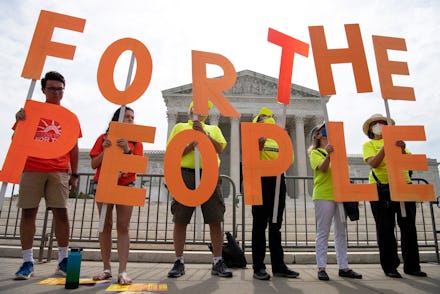The Supreme Court's conservative justices just took an axe to voting rights

The heavily conservative majority of the United States Supreme Court on Thursday took a major step forward toward weakening voting rights, ruling 6-3 to uphold a pair of draconian restrictions recently enacted in Arizona. The decision is a de facto boon to a broader GOP effort to manipulate the electoral process across the country.
The SCOTUS decision in Brnovich v. Democratic National Committee officially overturns an appeals court ruling. The previous ruling had stated that Arizona's new laws requiring election workers to toss out ballots cast in the wrong precinct, and criminalizing collecting ballots to deliver them en masse to the polls, violated Section Two of the 1965 Voting Rights Act by expressly affecting voters from minority communities.
"Arizona's out-of-precinct policy and H.B. 2023 do not violate [Section Two] of the VRA, and H.B. 2023 was not enacted with a racially discriminatory purpose," Justice Samuel Alito wrote in the majority decision. "Mere inconvenience cannot be enough to demonstrate a violation," he added.
Writing for the minority, however, Justice Elena Kagan put Thursday's ruling in stark terms. "What is tragic here is that the court has (yet again) rewritten — in order to weaken — a statute that stands as a monument to America's greatness, and protects against its basest impulses," she explained. "What is tragic is that the court has damaged a statute designed to bring about 'the end of discrimination in voting.' I respectfully dissent."
While the ruling does not do away with the Voting Rights Act entirely, it does further neuter the bill's efficacy beyond the already cataclysmic 2013 Shelby County v. Holder SCOTUS decision, which negated a lynchpin portion of the law requiring federal approval to change voting laws in areas deemed to have a history of racial discrimination. That decision opened the door for conservative local governments around the country to enact their own — frequently restrictive — voting legislation in what, cumulatively, amounts to a broad Republican effort to manipulate the voting process to ensure their own political rule.
Democrats, meanwhile, have made expanding voting rights a key tentpole of their 2021 legislative agenda. While those efforts have yielded little in the way of actual results so far, Thursday's ruling only underscores the urgency with which lawmakers hoping to salvage what's left of a viable electoral process must act.